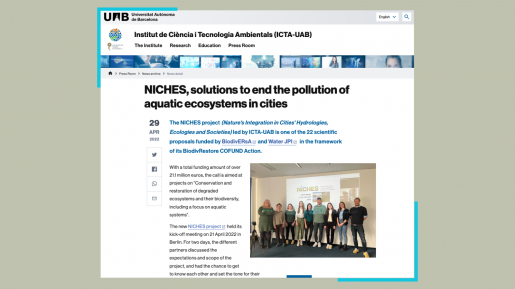Spreading the word: NICHES partner ICTA-UAB talks about the project
The Institute of Environmental Science and Technology (ICTA-UAB) at the Universitat Autònoma de Barcelona (UAB) has published an article on its website about the NICHES project, outlining its premise, purpose, and expected results. ICTA-UAB is a NICHES partner organisation and Barcelona is one of the five case study cities of the project. ICTA-UAB is a public university in Barcelona comprising 57 academic departments. It promotes innovation, employability and entrepreneurship. It strives to foster research and transfer in all areas of knowledge and works closely together with the surrounding business and industrial community, as well as with scientific centres.
The article begins with specifics about the joint Biodiversa and WaterJPI funding call on the topic of “Conservation and restoration of degraded ecosystems and their biodiversity, including a focus on aquatic systems,” that has funded 22 projects, one of them being NICHES.
The dangers of sewage overflow with combined wastewater, due to heavy rainfall events, are immense for freshwater biodiversity in urban areas. The environmental, but also social and economic effects of sewage overflow demand changes in city infrastructure so as to preserve natural aquatic biodiversity. The restorative potential of nature-based solutions (NBS) can greatly aid this process. This is why the NICHES project aims to analyse and propose restorative NBS for the mitigation of combined sewer overflows in cities and improve the state of freshwater biodiversity as a consequence.
The UAB article proceeds to outline NICHES’ objectives as well as its plan of action - to examine the biological and biophysical processes that cause the negative impacts on aquatic ecosystems and create a model with the hydrological and ecological functions of NBS that can improve freshwater areas. Through its case-study approach, NICHES will examine the social, institutional and governance systems in cities, each with a specific set of individual challenges, and acknowledge trade-offs and synergies between targeted benefits and policies for nature conservation and restoration.
To read more about the ICTA-UAB and its coverage of the NICHES project click here.
